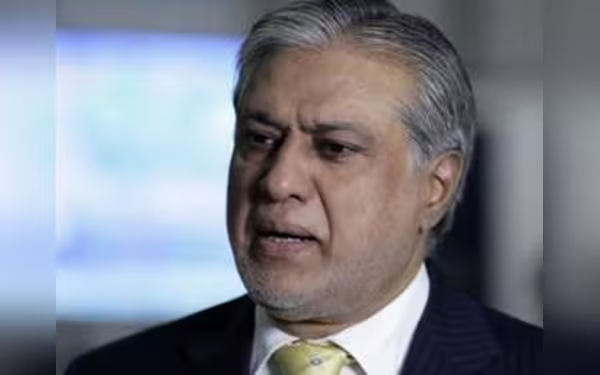Saturday, November 16, 2024 05:32 PM
Ishaq Dar Reaffirms Pakistan's Commitment to Combat Climate Change
- Pakistan emphasizes need for climate finance from developed nations.
- Early warning systems crucial for mitigating climate impacts.
- 2022 floods highlighted the urgency of climate action.
 Image Credits: nation_pk
Image Credits: nation_pkIshaq Dar emphasizes Pakistan's commitment to combat climate change and urges developed nations to fulfill climate finance pledges.
Climate change is a pressing global issue that affects millions of lives, particularly in countries like Pakistan, which is often ranked among the most vulnerable nations. The impacts of climate change are unpredictable and severe, leading to devastating consequences such as floods, droughts, and extreme heat. In light of these challenges, Pakistan's Deputy Prime Minister and Foreign Minister Ishaq Dar has reiterated the country's commitment to safeguarding lives from the adverse effects of climate change.
During a high-level event convened by the United Nations Secretary-General on ‘Delivering Early Warnings for All (EW4All) and Addressing Extreme Heat,’ held on the sidelines of the 29th Conference of the Parties to the United Nations Framework Convention on Climate Change (COP29) in Baku, Dar emphasized the urgent need for developed nations to fulfill their climate finance pledges. He called for accessible and grants-based climate financing to help developing countries, including Pakistan, achieve their climate goals.
Dar highlighted the importance of early warning systems for climate-induced hazards. These systems can play a crucial role in protecting communities from the unpredictable impacts of climate change. He pointed out that Pakistan has initiated several key projects aimed at reducing greenhouse gas emissions. These include the Green Pakistan Project, an Electric Vehicle Policy, a large-scale mangrove rehabilitation project, and the development of Bus Rapid Transit (BRT) mass transit systems across major cities.
Reflecting on the devastating floods of 2022, which resulted in catastrophic losses exceeding $30 billion and affected 33 million people, Dar stated, "If we had any early warning system, much of these impacts could have been mitigated, enabling us to respond proactively and avoid such immense suffering." This statement underscores the critical need for effective early warning systems to protect lives and livelihoods.
As the world grapples with the realities of climate change, it is essential for nations to unite in their efforts to combat its effects. The commitment shown by Pakistan's leadership is commendable, but it also highlights the responsibility of developed nations to support vulnerable countries. By honoring their climate finance promises, they can help ensure that no one is left unprotected from the severe impacts of climate change.
The fight against climate change requires collective action and unwavering commitment from all nations. As we move forward, it is crucial to prioritize the establishment of early warning systems and to invest in sustainable projects that can mitigate the effects of climate change. Only through collaboration and shared responsibility can we hope to protect our planet and the lives of those who inhabit it.













